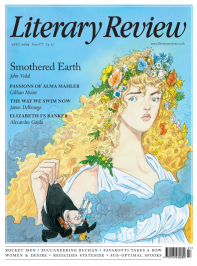Andrew Crumey
Space Oddities
The Moon: A History for the Future
By Oliver Morton
The Economist Books 333pp £20
Escape from Earth: A Secret History of the Space Rocket
By Fraser MacDonald
Profile Books 371pp £20
Doctor Dolittle in the Moon may be one of the animal communicator’s less well-known adventures, but it served as childhood inspiration for the science writer Oliver Morton. In The Moon, Morton considers our nearest cosmic neighbour in all its many forms: scientific, historical, cultural, artistic, political. With such an ambitious agenda, a great deal inevitably has to be left out, though an incredible amount is still crammed in.
The story of Dolittle’s lunar excursion, published in 1928, was the ninth in Hugh Lofting’s series about the doctor. It made use of the then-prevalent theory that the Moon originally flew off from the young, molten Earth, leaving a gap that became the Pacific Ocean. Since the 1980s we have understood it differently. In the early solar system, between the orbits of Venus and Mars, there were two planets that some astronomers now call Tellus and Theia. A collision at a speed of about ten kilometres per second destroyed both, their fragments subsequently coalescing into our world and its companion.
Lunar fiction goes back a long way: in the second century AD, Lucian of Samosata imagined flying to the Moon. Fifteen hundred years later, Johannes Kepler’s Somnium gave a detailed account of the Moon’s inhabitants, while Kepler’s English contemporary John Wilkins wondered if these Selenites, as he called

Sign Up to our newsletter
Receive free articles, highlights from the archive, news, details of prizes, and much more.@Lit_Review
Follow Literary Review on Twitter
Twitter Feed
Under its longest-serving editor, Graydon Carter, Vanity Fair was that rare thing – a New York society magazine that published serious journalism.
@PeterPeteryork looks at what Carter got right.
Peter York - Deluxe Editions
Peter York: Deluxe Editions - When the Going Was Good: An Editor’s Adventures During the Last Golden Age of Magazines by Graydon Carter
literaryreview.co.uk
Henry James returned to America in 1904 with three objectives: to see his brother William, to deliver a series of lectures on Balzac, and to gather material for a pair of books about modern America.
Peter Rose follows James out west.
Peter Rose - The Restless Analyst
Peter Rose: The Restless Analyst - Henry James Comes Home: Rediscovering America in the Gilded Age by Peter Brooks...
literaryreview.co.uk
Vladimir Putin served his apprenticeship in the KGB toward the end of the Cold War, a period during which Western societies were infiltrated by so-called 'illegals'.
Piers Brendon examines how the culture of Soviet spycraft shaped his thinking.
Piers Brendon - Tinker, Tailor, Sleeper, Troll
Piers Brendon: Tinker, Tailor, Sleeper, Troll - The Illegals: Russia’s Most Audacious Spies and the Plot to Infiltrate the West by Shaun Walker
literaryreview.co.uk